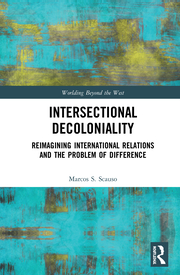Buy Intersectional Decoloniality: Reimagining International Relations and the Problem of Difference 1st Edition PDF ebook by author Marcos S. Scauso – published by Routledge in 2021 and save up to 80% compared to the print version of this textbook. With PDF version of this textbook, not only save you money, you can also highlight, add text, underline add post-it notes, bookmarks to pages, instantly search for the major terms or chapter titles, etc.
You can search our site for other versions of the Intersectional Decoloniality: Reimagining International Relations and the Problem of Difference 1st Edition PDF ebook. You can also search for others PDF ebooks from publisher Routledge, as well as from your favorite authors. We have thousands of online textbooks and course materials (mostly in PDF) that you can download immediately after purchase.
Note: e-textBooks do not come with access codes, CDs/DVDs, workbooks, and other supplemental items.
eBook Details:
Full title: Intersectional Decoloniality: Reimagining International Relations and the Problem of Difference 1st Edition
Edition: 1st
Copyright year: 2021
Publisher: Routledge
Author: Marcos S. Scauso
ISBN: 9780367369552
Format: PDF
Description of Intersectional Decoloniality: Reimagining International Relations and the Problem of Difference 1st Edition:
This book assesses diverse ways to think about “others” while also emphasizing the advantages of decolonial intersectionality. The author analyzes the struggles that emerge among Andean indigenous intellectuals, governmental projects, and IR scholars from the Global North. From different perspectives, actors propose and promote diverse ways to deal with “others”. By focusing on the epistemic assumptions and the marginalizing effects that emerge from these constructions, the author separates four ways to think about difference, and analyzes their implications. The genealogical journey linking the chapters in this book not only examines the specificities of Bolivian discussions, but also connects this geo-historical focal point with the rest of the world, other positions concerning the problem of difference, and the broader implications of thinking about respect, action, and coexistence. To achieve this goal, the author emphasizes the potential implications of intersectional decoloniality, highlighting its relationship with discussions that engage post-colonial, decolonial, feminist, and interpretivist scholars. He demonstrates the ways in which intersectional decoloniality moves beyond some of the limitations found in other discourses, proposing a reflexive, bottom up, intersectional, and decolonial possibility of action and ally-ship. This book is aimed primarily at students, scholars, and educated practitioners of IR, but its engagement with diverse literature, discussions of epistemic politics, and normative implications crosses boundaries of Political Science, Sociology, Gender Studies, Latin American Studies, and Anthropology.





